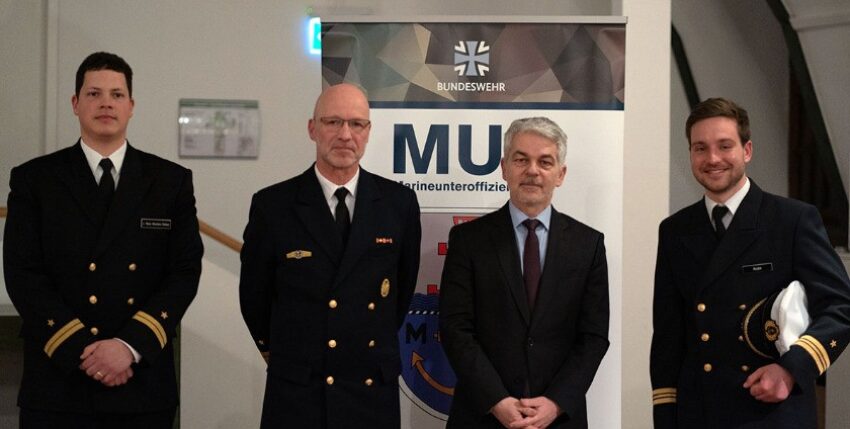[et_pb_section fb_built="1" _builder_version="4.16" global_colors_info="{}"][et_pb_row _builder_version="4.16" background_size="initial" background_position="top_left" background_repeat="repeat" global_colors_info="{}"][et_pb_column type="4_4" _builder_version="4.16" custom_padding="|||" global_colors_info="{}" custom_padding__hover="|||"][et_pb_text _builder_version="4.19.5" background_size="initial" background_position="top_left" background_repeat="repeat" global_colors_info="{}"]Military expert Masala: "The 21st century will be a maritime one"
The third part of the winter lecture series took place at the Naval NCO School in Plön on 22 February. The guest speaker was the German political scientist Professor Carlo Masala. The guests from society, politics and the Bundeswehr listened to almost 90 minutes of exciting political analyses and assessments of the current security policy situation. The central topic was the importance of the German, but also American, Russian and Chinese navies.
One of Professor Masala's assumptions was that, for centuries, wars have tended to be planned and waged from the land side, i.e. with the help of national armies. A war can only be won with an army, a conflict can only be avoided with armies. However, this view would neglect the maritime components too much, as most states, especially the USA, would only realise their own geostrategic goals through their navies. This would begin with the use of certain terms. In politics, the more accurate term "naval power" is rarely used, as it sounds too harsh and military. Instead, terms such as "martim" or "navy" would be used, which include maritime warfare, but also many other civilian terms such as the environment or trade.
At the same time, it would be of central importance to name the military warfare and security concept at sea in this way in the eyes of the general public. Only when maritime issues are recognised and understood in society can an effective "Navy" be formed, as in the USA. This in turn is of central importance for the sustainable defence of one's own security interests. This has always been the case, even during the Cold War, and the core principle of NATO is that of a "maritime alliance".
According to Professor Masala, the 21st century has the potential to become a maritime one. This can be recognised, among other things, by the fact that in a war of aggression such as the one currently being waged by Russia in Ukraine, there are also threats of trade restrictions on the seaside, for example with grain. Trade bottlenecks are deliberately included in strategic warfare and these in turn can only be controlled with strong navies. The impact of trade bottlenecks on our societies, which are heavily dependent on the economy, could already be clearly seen during the coronavirus pandemic and also at the beginning of the Ukraine war.
It is also important for Europe to stand by its military partners such as the USA - albeit often only symbolically. An example of this was the frigate Bayern, which underlined its continued commitment to freedom of navigation and the preservation of the rules-based international order in the Indo-Pacific by transiting the South China Sea between 2021 and 2022. The exclamation "We share your threat perception" could literally be heard with this presence. Such missions and support efforts on the part of Germany would continue to be important. "The Americans see something like this," said Carlo Masala.
Apparently, however, political decisions are not yet orientated towards this maritime necessity, as can be seen from the fact that the 100 billion special fund is not divided equally between the various branches of the armed forces. The navy receives the smallest financial share.
Professor Masala emphasises once again that the expansion of some states, such as Russia and China, which is contrary to international law, must be stopped immediately and emphatically, as otherwise there is a serious risk that this will become a habit. The USA, in particular, has recognised this and is acting accordingly with an increased, albeit temporary, presence in Europe.
It is of the utmost importance to stop revisionist states that want to reverse a position of power that is supposedly unequal or unfavourable to them and to continue to uphold democratic values.
Some things seem to be repeating themselves historically and it is important to learn from history.
Text: MUS Plön / Sebastian Krohn
[/et_pb_text][et_pb_gallery gallery_ids="27744,27745,27746,27747,27748,27749,27750" posts_number="7" _builder_version="4.19.5" _module_preset="default" global_colors_info="{}"][/et_pb_gallery][/et_pb_column][/et_pb_row][/et_pb_section]







